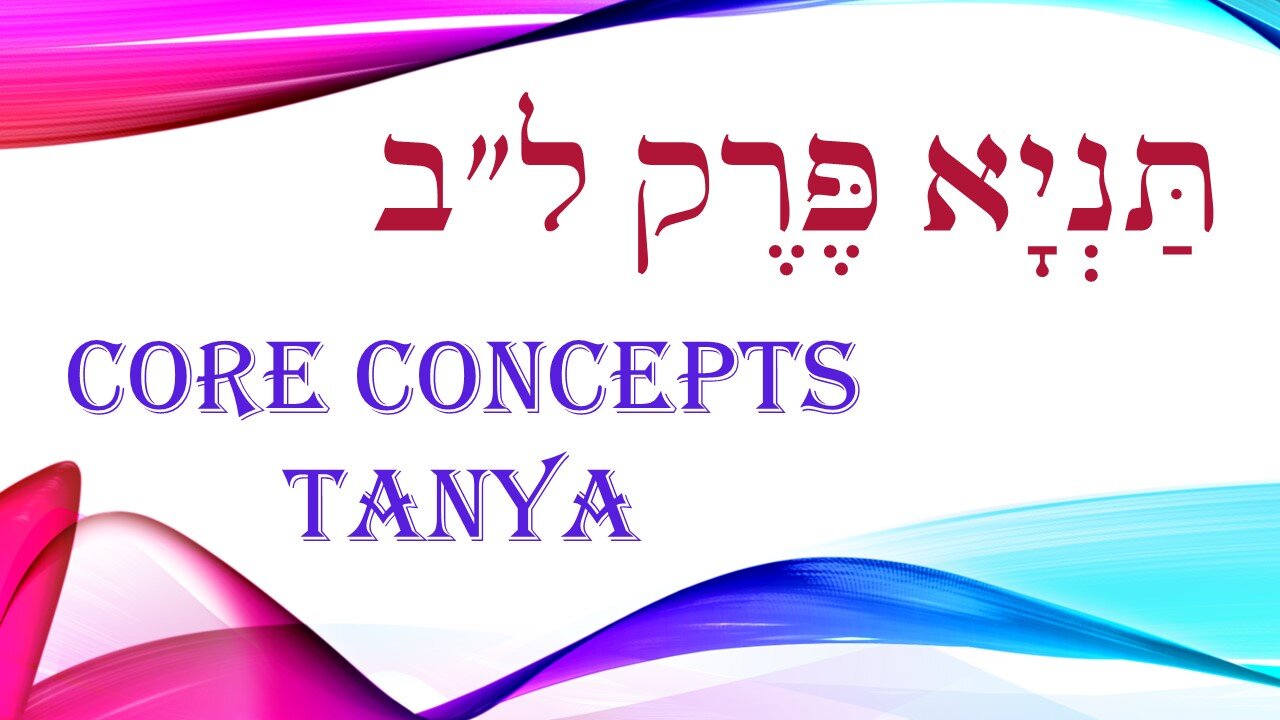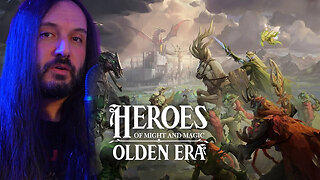Premium Only Content

Core Concepts Tanya: Chapter 32
Brief recap of Chapter 32:
1. Chapter 32 is known as the "Ahavas Yisroel" chapter, and fittingly, according to "gematria”, 32, lamed and bet, is "lev," heart.
2. Building on what Tanya has been speaking about adjusting our perspective and emphasis from the physical to the spiritual, this chapter now asks, what does it mean to love my fellow as myself? Sure, it's easy to love someone we've never met, to believe in the larger collective, but what someone I have met and know a thing or two about? How can I be expected to love such a person, specifically as much as I love myself?
3. Do you love yourself for the things you can do? For your features? Or do you love your essence, the core and totality of who you are?
When you make a mistake, when you identify a flaw, do you forgive/rationalize/compartmentalize/find reasons why it's not so bad?
This is the sort of consideration we're supposed to extend to others.
4. How? It all comes down to perspective.
What's primary, body or soul?
If body, as in the physical, then your needs and desires and someone else's may be in opposition.
Someone can literally take up your space.
But if soul is more important, as in the spiritual, then there is no physical matter to take up your space.
Love based on the physical/external does not last, as it will only last as long as that reason holds true. The body is where our differences are, body separates us.
5. A love based on the internal/spiritual is much more enduring.
When we focus on the soul, we realize:
(A) All souls have the same source, our Father in Heaven.
Thus, all Jews are actual brothers, so our love is natural between siblings.
(B) We don't know what soul anyone has, and we certainly don't know whose soul is greater.
As the soul begins its descent into the world, some are more "affected" than others, so their potentials and capabilities are less obvious. But that doesn't define the soul itself.
Would you really dismiss someone because of their physical differences if you knew that their soul shined brighter than yours?
6. When a man came to Hillel and asked him to teach him the whole Torah on one foot, Hillel replied "What is hateful to you, do not do unto others. This is the whole Torah. Go and learn."
We understand this rule is the foundation for dealing with others, but how does it also define our relationship with Hashem?
Because, in achieving Ahavas Yisroel, we are placing the soul first, which IS the foundation of our relationship with Hashem.
Moreover, the Torah elevates and exalts the soul above the body, it raises the spiritual over the physical, closer and closer to the source where we are all one.
Plus, Torah draws down the light of Hashem's essence into the Jewish people, so the Oneness of Hashem unites with the oneness of Israel.
BUT this can only happen where there is unity among people, as Hashem does not dwell in a fragmented place.
7. Talmud teaches if we see our fellow sinning, then we're supposed to hate him. How does this fit with everything?
To paraphrase the Frierdiker (Previous) Rebbe, this law only appears toward the end of the Code of Jewish Law. First get the rest down, then we can reexamine what to do about this one law.
Practically, first we have to make sure this fellow is our actual fellow, as in on the same level of Torah and Mitzvot.
IF so, then we first try to rebuke him and steer him right, being honest about the efficacy of our efforts and the amount of heart and soul we're putting in.
THEN, we're still required to love him BUT we hate the evil within him.
8. How can love and hate coexist?
These emotions are coming from two different places.
We love the individual, but we hate the evil they are committing.
Furthermore, we must practice compassion in realizing that their holy soul is trapped in a body engaging in negative behaviors.
Compassion will banish hate and bring about love because we will remember and focus on the soul, which is still pure and our brother.
No matter what, love for another should be the guiding attitude in relation to others.
9. Hillel teaches that we should be of the disciples of Aharon, love peace and pursue it, love all creatures and bring them close to Torah.
The word creatures is used specifically because even if the only thing someone has going for him is he’s a creation of Hashem, we must still love him!
Moreover, we should endeavor to draw him closer, with love, to Torah, because this allows his soul to truly shine and help him realize how much he can be.
-
 LIVE
LIVE
The Bubba Army
22 hours agoTRUMP SAYS NO MORE INCOME TAX? - Bubba the Love Sponge® Show | 12/03/25
1,234 watching -
 LIVE
LIVE
FyrBorne
13 hours ago🔴Battlefield REDSEC Live M&K Gameplay: Testing Sleeper Loadouts
157 watching -
 28:54
28:54
ZeeeMedia
16 hours agoREAL ID Non-Compliance Fees from 2026 & WW3 Escalation | Daily Pulse Ep 154
9.66K34 -
 LIVE
LIVE
PudgeTV
4 hours ago🔴 Sea of Thieves - Gaming on Rumble | The Three Rumskateers Go Sailing Again!!
144 watching -
 1:27:15
1:27:15
Midnight In The Mountains™
1 hour agoMorning Coffee w/ Midnight & The Early Birds of Rumble | Pudge Made me LATE! |
2.21K2 -
 LIVE
LIVE
Pickleball Now
5 hours agoLive: IPBL 2025 Day 3 | Nonstop Action from India’s Biggest Pickleball League
64 watching -
 1:12:46
1:12:46
MetatronGaming
1 day agoLet's Try Heroes of Might and Magic The Olden Era
40.5K2 -
 1:02:58
1:02:58
Coin Stories with Natalie Brunell
19 hours agoBitcoin’s ‘Silent IPO’ Moment & The Coming AI Shockwave with Jordi Visser
25.4K3 -
 21:06
21:06
Nikko Ortiz
16 hours agoBodycam's Zombie Update Is Crazy...
22.7K3 -
 42:52
42:52
Code Blue Cam
1 day agoDrunk Teacher's First and Last Day at Elementary School
21.4K9